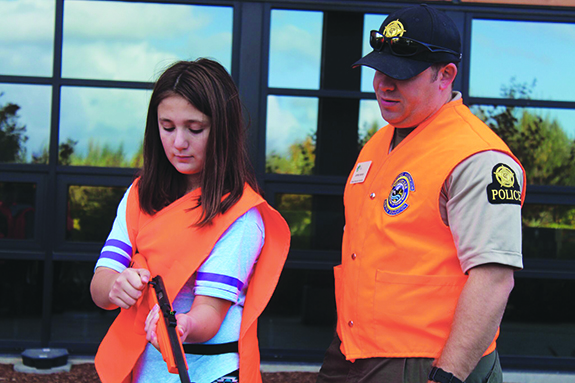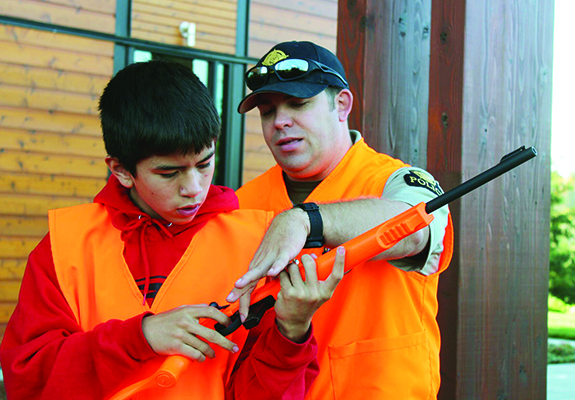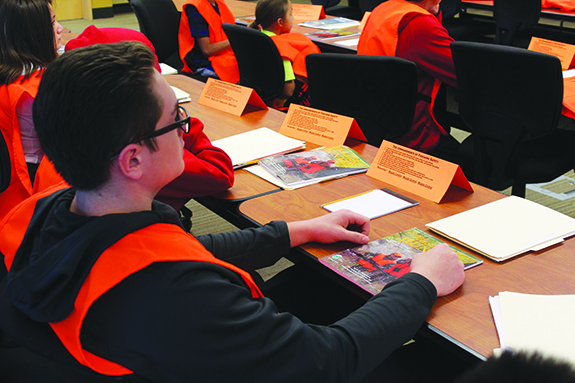By Kalvin Valdillez, Tulalip News
Over the weekend of October 21-22, ten Tulalip tribal members, comprised of nine youth ages eight through eighteen and one parent, spent their days off at the Tulalip Administration Building learning the fundamentals of hunting and firearm safety. The course, presented by the Stillaguamish Tribe’s Fish and Wildlife Enforcement Office, is a Washington State requirement for hunters who wish to obtain a Washington hunting license; as well as a requirement for Tulalip tribal members between the age of fourteen and eighteen who wish to obtain big game hunting tags.
“The course was first initiated when [Tulalip Fish and Wildlife Director] Jason Gobin and [Tulalip Natural Resources Licensing/Records Technician] Yvonne Williams asked us to come from the Stillaguamish Tribe to teach a Hunter Education Class,” explains Stillaguamish Fish and Wild Life Enforcement Captain, Bill Hebner. “The Tulalip Tribes require Hunter Education in order to obtain a hunting and fishing license. It’s a state course and we’re state authorized instructors and we like to cooperate and work closely with the Tulalip Tribes.
“This course is designed primarily for state hunters, but because of Tulalip’s treaty rights, we get to cover unique situations in addition to what the state offers,” he continues. “Because our instructors are from the Stillaguamish tribes, we’re able to bring the tribal perspective and interject. In addition to all the requirements from the state course, we can talk about some of the intricacies involved from a tribal perspective, which usually isn’t presented during a state course at all. It was really nice to have a tribal only class. We also do that in Stillaguamish, because we like to customize it and usually what that means is providing additional information than the requirements from the state class, and the student’s leave with a lot brighter perspective.”
Hunter Education teaches the basics of hunting, such as game identification, firearm safety, zone-of-fire and the importance of wearing hunter orange. The course requires sixteen hours of class time and is taught through an eleven-chapter workbook, a variety of videos and ends with a hands-on outdoor firearm safety course, which details the safe handling, loading and unloading of firearms as well as safe carrying positions.
“We cover a myriad of topics from the safe handling of fire arms, cause of hunting incidents, conservation, first aid and survival,” Bill states. “We cover a number of different topics that are required and make up the statewide curriculum for the Hunters Education course. At the end of the course we give an exam and students are required to pass with at least seventy-five percent accuracy.”
The young tribal members were engaged from the beginning to the end of the ineteractive course. Several youth are excited for the chance to exercise their hunting rights including Tony Hatch who states that she, ‘just can’t wait to get my first elk’. Fellow student, Kaiser Moses, believes the course is informative and recommends it to all young inspiring hunters.
“Some of the biggest things I learned are how to hunt and the sportsmanship of hunting; the do’s and don’ts,” said Kaiser. “I liked that the instructors who taught the class went over our hunting and fishing rights. I think when I’m ready, I’ll go hunting and I’ll bring home an elk or deer and my mom will get to prepare it. I like the traditional aspect of going out and hunting, bringing the meat home, preparing and cooking it. It’s definitely more traditional than just going to Haggen or Albertsons. I feel like other people should take a class like this. If you get the chance to or if you plan on hunting, it’s really helpful and I really enjoyed it, it was fun!”
The students now anxiously wait for the results of their exam; those who received a test score of seventy-five percent or higher can take the next step in obtaining their hunting permits. For further details, please contact the Tulalip Natural Resources Department at (360) 716-4480.


